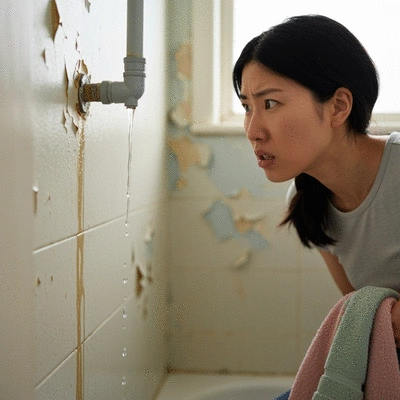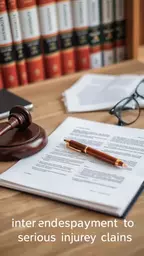Inadequate Heating or Hot Water
This issue compromises comfort, requiring prompt action by landlords.
Unlock your FREE 'Quick-Start Guide to No Win No Fee Claims' and demystify the legal process.
Posted on: 2025-08-24
By: Sarah Thompson
Understanding your rights as a tenant can be the difference between a safe, comfortable home and a disrepair nightmare. With knowledge in hand, you can advocate for yourself effectively. Let’s delve into what you will learn from this essential guide!
This section illustrates the significant issues that fall under housing disrepair, affecting tenant rights and living conditions. For a comprehensive overview of your entitlements, consider reading our guide on understanding housing disrepair claims.
This issue compromises comfort, requiring prompt action by landlords.
Can lead to health risks and property damage if not addressed.
Cracks and instability pose safety risks to tenants.
Faulty systems can lead to dangerous situations.
Health risks arise from common pests like rodents and insects.
Navigating the world of housing disrepair can be daunting for many tenants. It’s crucial to understand what constitutes disrepair and the rights you hold as a tenant in the UK. This knowledge empowers you to advocate for yourself and ensures that your living conditions are safe and habitable. Let’s explore the basics together!
Housing disrepair refers to any significant issues within your rental property that compromise its safety, comfort, or overall habitability. These issues can arise from a variety of factors, and knowing your rights will help you address them effectively.
Housing disrepair can take many forms, and recognizing the common types can help you identify when to take action. Here’s a quick overview of what typically falls under housing disrepair:
Each of these issues can have a significant impact on your quality of life. If you notice any of these problems in your rental home, it’s essential to address them promptly.
As mentioned, common types of housing disrepair include damp and mould, structural defects, and plumbing or electrical problems. Understanding these issues is vital. For example, damp and mould can not only damage your property but also pose serious health risks. Structural defects, on the other hand, can lead to unsafe living conditions if not addressed. Being aware of these issues can help you maintain a safe and comfortable environment. For more information on protecting your rights, you might find our article on understanding no win no fee claims helpful in understanding your options for legal assistance.
Moreover, you have specific legal rights that protect you as a tenant. These rights are designed to ensure that your landlord keeps the property in good repair and meets safety standards.
Under UK housing law, tenants have a right to live in a property that is safe and well-maintained. This includes:
Understanding these rights will help you navigate the claims process should you encounter housing disrepair. Keep in mind, if you experience issues, don’t hesitate to reach out for advice or assistance. At Solicitors No Win No Fee, we’re here to help you understand your options and advocate for your rights!
Once you're familiar with what housing disrepair is, it’s essential to identify the common types you may encounter. Let’s delve into some typical issues faced by tenants, as these can significantly impact your living condition.
Damp and mould are unfortunately common issues in many rental properties. They can stem from poor ventilation, leaks in plumbing, or structural issues. Understanding how to spot these problems early can help you address them before they worsen.
Look out for the following signs:
If you notice any of these symptoms, it’s important to take action, as unchecked dampness can lead to serious health issues.
Living in damp conditions can lead to various health problems, including respiratory issues and allergies. Protecting your health should be a priority, and knowing how to address damp and mould issues is crucial for your well-being.
Structural defects can pose serious risks to your safety and should be taken seriously. Identifying these issues early can prevent accidents and injuries.
Look for signs such as:
Recognizing these signs can help you advocate for necessary repairs.
Landlords have a legal obligation to ensure that the property is structurally sound. If you encounter structural issues, it’s your right to request repairs. Staying informed about these responsibilities can empower you in your discussions with your landlord.
Problems with plumbing and electrical systems are not only inconvenient but can also be hazardous. Understanding how to identify these issues is essential for maintaining a safe living environment.
Common plumbing problems include:
These problems can lead to more significant issues, such as water damage or contamination. It’s crucial to address them promptly.
Electrical issues can be dangerous. Keep an eye out for:
If you notice any of these signs, it’s essential to contact your landlord immediately to ensure your safety.
Having consistent heating and hot water is a basic necessity. If you find yourself without these, it can significantly affect your quality of life.
Look for:
Recognizing these signs early can help you stay warm and comfortable, especially during colder months.
As a tenant, you have the right to a functioning heating system. If your heating or hot water is malfunctioning, it’s your right to request repairs without delay.
Pest infestations can pose serious health risks and impact your living conditions. Knowing how to identify these issues is vital.
Common household pests include:
These pests can cause health issues and may indicate larger problems within your property.
Landlords are generally required to deal with pest infestations promptly. If you encounter any pests, make sure to communicate with your landlord as soon as possible.

Have you ever faced issues with housing disrepair in your rental property? We want to hear from you! Please take a moment to share your experience:
As a tenant, understanding your rights in housing disrepair situations is crucial. Many individuals may find themselves unsure of what to do when issues arise in their rental properties. That's why I aim to clarify these rights so you can protect yourself and your living conditions effectively!
In the UK, tenants have a range of rights under housing law, particularly relating to the condition of their homes. It's essential to recognize that landlords are legally obligated to ensure your property is safe and habitable. Knowing these rights can empower you to take the necessary steps to address any problems in your rental.
Being aware of your rights as a tenant can make a significant difference when dealing with housing disrepair. Here’s why it’s so important:
By familiarizing yourself with these aspects, you can ensure that you are not left in an unsafe or uncomfortable living situation. Remember, the more informed you are, the better equipped you’ll be to advocate for yourself!
Taking proactive measures can help prevent complications related to housing disrepair. Here are some steps you can take:
These proactive steps can not only help resolve issues faster but also provide essential evidence if disputes arise later. Remember, staying organized and informed is key! If you face workplace issues, gaining a better understanding of your rights can also be beneficial, as detailed in our guide on navigating workplace disputes in the UK.
When you encounter housing disrepair, it’s crucial to approach your landlord with a clear plan. Here’s how you can report issues effectively:
Effective communication can often lead to quicker resolutions, ensuring your living conditions improve without unnecessary delays!
If your landlord fails to address serious repairs, seeking compensation may be necessary. Here’s how you can begin:
Taking these steps can help ensure that you are compensated fairly for any distress or inconvenience caused by the disrepair!
Local authorities play a vital role in maintaining housing standards in the UK. They are responsible for ensuring that rental properties comply with health and safety regulations. When tenants report issues, local councils can inspect properties and enforce necessary repairs.
Understanding this process can be helpful if your landlord neglects their duties. Local authorities can issue improvement notices, requiring landlords to make repairs within a specified timeframe. If they fail to comply, further legal action can be taken!
Environmental hazards, such as mould, pests, and structural defects, can significantly impact tenants’ health and well-being. It’s essential to recognize these hazards and address them promptly:
Being aware of these hazards not only helps you maintain your health but also reinforces your rights as a tenant. If you encounter any of these issues, report them immediately to your landlord and consider involving local authorities if necessary!

Here is a quick recap of the important points discussed in the article:

 Did you know that many tenants are unaware of their rights regarding housing disrepair? Understandin
Did you know that many tenants are unaware of their rights regarding housing disrepair? Understandin
 In today's uncertain job market, knowing your rights when it comes to termination is more crucial th
In today's uncertain job market, knowing your rights when it comes to termination is more crucial th
 In the world of serious injury claims, navigating financial challenges can be daunting. Interim paym
In the world of serious injury claims, navigating financial challenges can be daunting. Interim paym